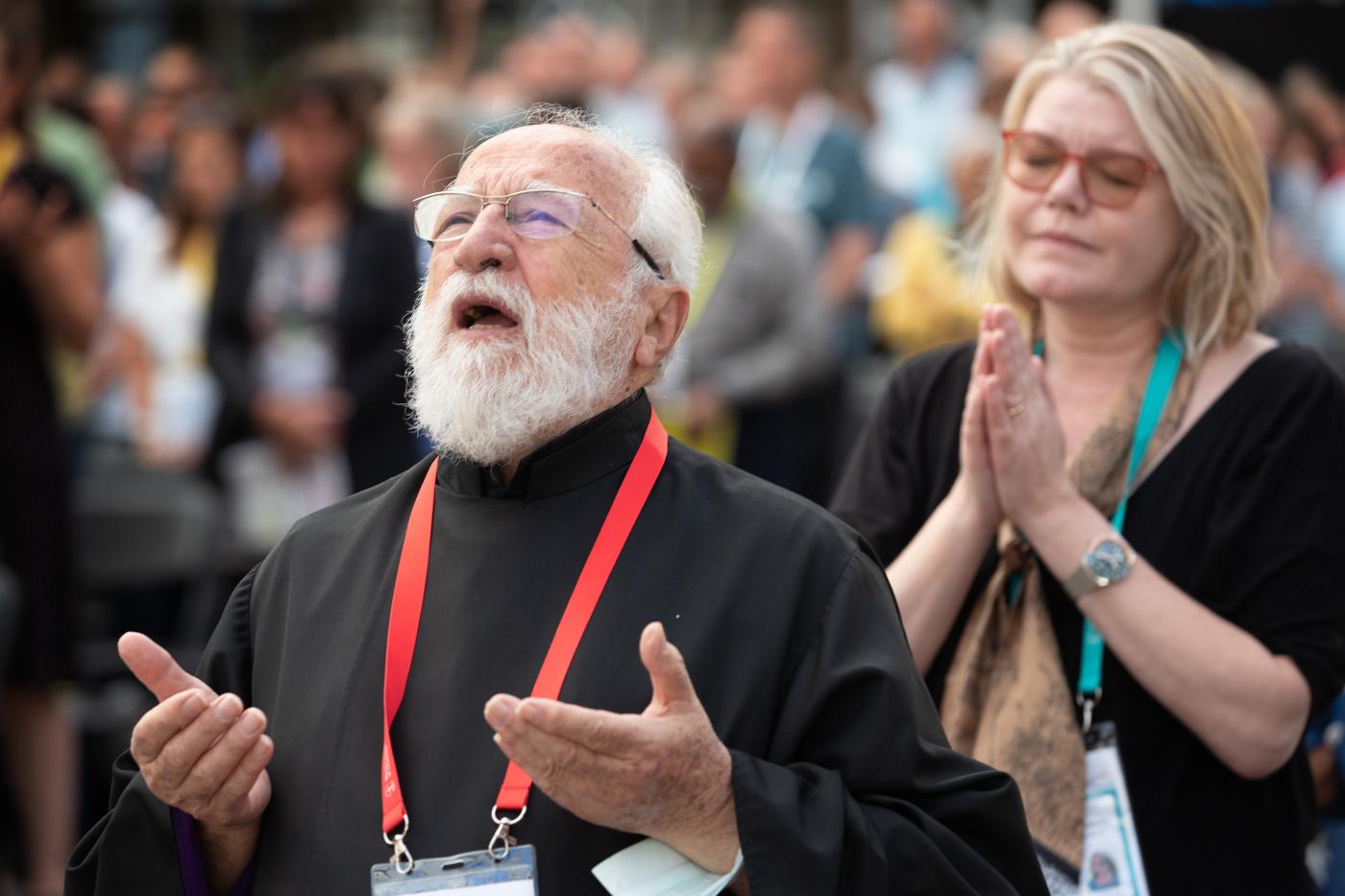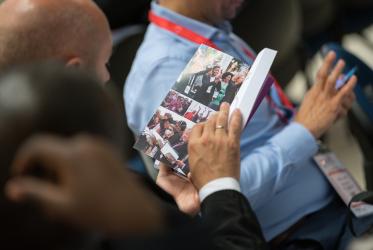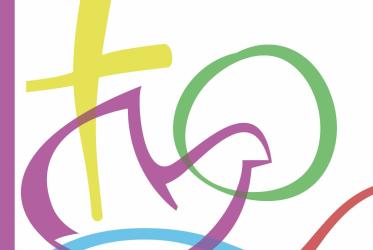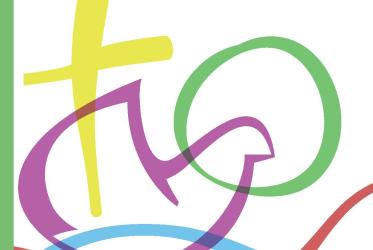The global body sent many messages to the world related to the theme “Christ’s love moves the world to reconciliation and unity.”
Dr Agnes Abuom opened the gathering, the last for the moderator, a Kenyan Anglican.
"Absolutely fundamental to the WCC and the ecumenical movement are relationships," said Abuom. "That's what makes experiences like the assembly so precious and formative. We encounter one another – in all our uniqueness – and recognize a neighbour in the stranger, unity in the midst of our diversity."
WCC acting general secretary Rev. Prof. Dr Ioan Sauca shared a report that touched upon the climate crisis, COVID-19, the war in Ukraine, and many other challenges in the world.
“In responding to the hardships of our times, we need one another, we depend on one another, and we can advance only if we walk together, not in separation,” said the Romanian Orthodox who has led the WCC since April 2020.
German federal president Frank-Walter Steinmeier delivered a keynote speech and the minister-president of Baden-Württemberg Winfried Kretschmann also offered remarks.

31 August 2022, Karlsruhe, Germany: Frank-Walter Steinmeier, Federal President of Germany, addresses the 11th Assembly of the World Council of Churches, held in Karlsruhe, Germany from 31 August to 8 September 2022.
Steinmeier recalled with thankfulness that the German churches were permitted to attend the 1st WCC Assembly in Amsterdam in 1948 and were welcomed as members on an equal footing. "To this day, we are grateful for this!" he said.
The war in Ukraine was in thoughts, prayers, and words on several occasions at the assembly, Steinmeier calling it a "war of aggression.”
The opening prayer included a sermon by the WCC President, Patriarch John X of the Greek Orthodox Church of Antioch (in Syria) and all the East. He called on his listeners and their churches and nations “to choose to pass through the suffering Middle East, as Christ chose to pass through Samaria. Pass and look at Christ’s beloved ones there, as he looked at the Samaritans, without disregarding those who differ from you, without excluding the people of Syria, Lebanon, Iraq and the Holy Land of Palestine, especially because their ancestors served the gospel of reconciliation and spread it to all nations.”

4 September 2022, Karslruhe, Germany: A ecumenical service with protestants, catholics evangelical free church and farsi speaking community in Schlosshof Ettlingen at the 11th Assembly of the World Council of Churches, held in Karlsruhe, Germany from 31 August to 8 September, under the theme "Christ's Love Moves the World to Reconciliation and Unity."
Local German host churches welcomed more than 3,500 people to the assembly—and to the city of Karlsruhe. Over 70 weekend excursions across Germany and into France and Switzerland were organized on the weekend. More than 200 cultural and information events took place in the host city itself. Following a reception hosted by Karlsruhe Mayor Frank Mentrup, assembly participants were invited to a special light show at the Karlsruhe palace.
Addressing the world’s challenges
The WCC 11th Assembly issued four public statements and four minutes expressing concern and suggesting ways to address some of the world’s major challenges.
The four statements are:
“Living Planet: seeking a just and sustainable global community.” This statement raises an increasingly urgent voice of concern and demand for action. “Christ’s love calls us to deep solidarity and a quest for justice for those who have contributed to this emergency the least, yet suffer the most, physically, existentially, and ecologically,” reads the statement.
“The Things that Make for Peace; moving the world to reconciliation and unity.” This statement calls for a renewed commitment to peace.
Recognizing the need for, “renewed dialogue within the ecumenical movement,” the statement strongly affirms “the commitment of the WCC and its member churches to peace making through inter-religious dialogue and cooperation at all levels,” and calling for a global ceasefire.
“War in Ukraine, Peace and Justice in the European Region.” The statement appeals “to all sides in the conflict to respect the principles of international humanitarian law…especially with regard to the protection of civilians and civilian infrastructure, and for the humane treatment of prisoners of war.”
It strongly affirms that war is incompatible with God's very nature.
"We urge all parties to withdraw and refrain from military action in the vicinity of the Zaporizhzhia nuclear power plant and other such locations that may risk unimaginable threats to current and future generations," reads the text.
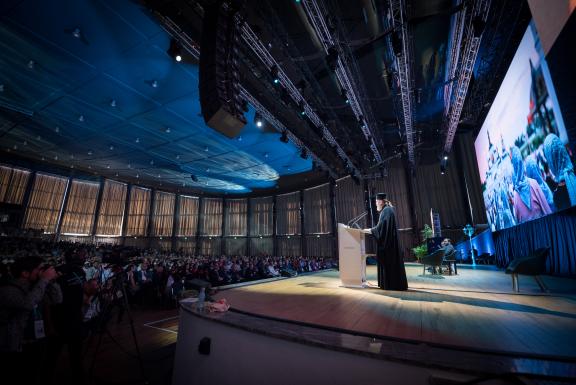
2 September 2022, Karlsruhe, Germany: H.E. Archbishop Yevstratiy of Chernihiv and Nizhiyn (Ukraine) speaks during a thematic plenary focused on Europe, at the 11th Assembly of the World Council of Churches, held in Karlsruhe, Germany from 31 August to 8 September, under the theme "Christ's Love Moves the World to Reconciliation and Unity."
“Seeking Justice and Peace for All in the Middle East.” The assembly heard the increasing pleas of the Holy Land heads of churches concerning mounting intimidation, violations, limiting access to places of worship, and attacks by radicals.
"The WCC affirmed the rightful place of Israel in the community of nations, recognizing its legitimate security needs.
"At the same time, we affirm the right of the Palestinians for self-determination and that the Israeli occupation of the Palestinian territories since 1967, as well as settlement construction and expansion in the occupied territories, is illegal under international law and must be ended."
The assembly also released the following four minutes:
Minute on ending the war and building peace on the Korean Peninsula. “…despite the signing of an armistice agreement on 27 July 1953, the Korean War still has not been formally ended,” the minute reads. The minute urges WCC member churches and partners to renew their solidarity and to actively support and accompany the Korean churches in their advocacy.
Minute on the situation in West Papua. The minute expresses grave concern over serious, systemic violations of security and human rights in West Papua. "The Indigenous Papuan people – the vast majority of whom are Christians – continue to suffer serious and systemic violations of their physical security and human rights,” it reads.
Minute on consequences of the 2020 Nagorno-Karabakh war. This minute reiterates its condemnation of the use of chemical weapons and cluster munitions, the targeting of civilians, hospitals and public infrastructure, and all other war crimes, beheadings, torture and other atrocities witnessed during the conflict.
Minute on Syriac-Aramaic genocide “SAYFO.” The minute urges that this genocide must be named as an historical reality.
During the “Syriac genocide,” or “SAYFO,” in 1915, over half a million Syriac-Aramaic Christians lost their lives. “Though taking place in the same historical and political context, these events are understood as distinct and separate from the Armenian genocide” the minute reads.
Unity Statement
The assembly received, adopted, and approved a Unity Statement of the WCC 11th Assembly, which addresses the distinctive call to Christian love in today’s world. Successive WCC assemblies have offered a statement or theme to inspire the churches to reflect on why they have chosen to journey together and the significance of the call to unity.

31 August 2022, Karlsruhe, Germany: Delegates and visitors gather for a photo on the opening day of the World Council of Churches' 11th Assembly in Karlsruhe, Germany. The assembly takes place August 31 to September 8 under the theme "Christ's Love Moves the World to Reconciliation and Unity."
Increasing youth participation
The assembly recommended increasing youth participation in the global ecumenical fellowship. The assembly received, affirmed, and endorsed a Youth Statement signed by 38 youth members of the assembly, including 12 delegates and nine advisers. The assembly is referring to the WCC central committee for action, noting “the need for full youth involvement in all commissions, committees, advisory groups, and reference groups of the WCC, but also the apparent reluctance of some member churches to nominate young people to the central committee and other committees.”
COVID-19 impacted income, ways of work
The impact of the COVID-19 pandemic in 2020 and 2021 resulted in reduced income for the WCC and led to an adaptation in ways of working.
"When the assembly met in Busan in 2013, in the wake of the financial crisis of 2008, there was concern over both the decreasing levels of income, and the loans taken to refinance the pension fund," the report said.
"However, the launch of the WCC strategic plan by central committee in 2014 marked the start of a new cycle, during which a remarkable level of stability in contributions had been attained."
New leadership elected
The WCC central committee elected Bishop Dr Heinrich Bedford-Strohm of the Evangelical Lutheran Church in Bavaria as its new moderator. The central committee also elected two vice moderators, Rev. Merlyn Hyde Riley, Jamaica Baptist Union; and H.E. Archbishop Dr Vicken Aykazian, Armenian Apostolic Church, Mother See of Holy Etchmiadzin.

8 September 2022, Karlsruhe, Germany: World Council of Churches leadership poses for a photo at the conclusion of the 11th Assembly of the World Council of Churches is held in Karlsruhe, Germany from 31 August to 8 September, under the theme "Christ's Love Moves the World to Reconciliation and Unity." Left to right: WCC acting general secretary Rev. Prof. Dr Ioan Sauca; vice-moderator of the WCC central committee Rev. Merlyn Hyde Riley, Jamaica Baptist Union; WCC central committee moderator Bishop Dr Heinrich Bedford-Strohm of the Evangelical Lutheran Church in Bavaria; WCC central committee vice-moderator H.E. Archbishop Dr Vicken Aykazian, Armenian Apostolic Church, Mother See of Holy Etchmiadzin; and WCC general secretary elect Rev. Dr Jerry Pillay.
On 8 September, the central committee also elected the executive committee.
Among the elected executive committee members are 48% women and 52% men, 80% ordained and 20% lay, 8% Indigenous persons, 4% persons with disabilities, and 12% youth.
On 6 September, the WCC 11th Assembly elected its 150-person central committee, the main decision-making body of the WCC between assemblies.
Assembly message: “A Call to Act Together”
All are called by Christ’s love to repentance, reconciliation, and justice in the face of war, inequality, and sins against creation, delegates at assembly stated in a message issued on 8 September.
"We will find a strength to act from a unity founded in Christ’s love, for it enables us to learn the things that make for peace, to transform division into reconciliation, and to work for the healing of our living planet,” delegates stated.
Videos of the WCC 11th Assembly in Karlsruhe, Germany

1 September 2022, Karlsruhe, Germany: WCC central committee moderator Dr Agnes Abuom declares that the WCC is handing over a Cedar tree to the city of Karlsruhe during the first thematic plenary of the WCC 11th Assembly, focused on Care for Creation is marked on 1 September, also known as the Day of Creation. Left to right: Mayor Frank Mentrup of Karlsruhe; Dr Agnes Abuom; Julia Rensberg, a delegate of the Church of Sweden, representing the Sámi Council within the Church of Sweden; Bjorn Warde, a delegate of the Presbyterian Church of Trinidad and Tobago. The 11th Assembly of the World Council of Churches is held in Karlsruhe, Germany from 31 August to 8 September, under the theme "Christ's Love Moves the World to Reconciliation and Unity."
